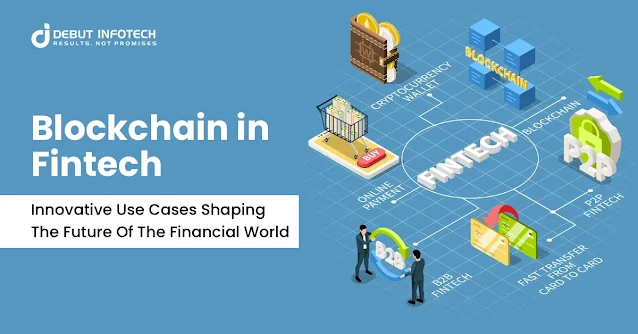Blockchain technology continues to revolutionize industries with its decentralized and transparent nature. As we embark upon the promising year of 2023, a number of captivating trends are set to transform the blockchain landscape.
In this article, we delve deep into the 10 promising blockchain trends that are poised to disrupt business models, drive innovation, and foster widespread adoption.
1. DeFi 2.0- Transforming the Future of Decentralized Finance
In 2023, Decentralized Finance (DeFi) will witness a groundbreaking transformation, known as DeFi 2.0. Following this, the evolution will emphasize scalability, interoperability, and enhanced user experiences in DeFi applications. Moreover, DeFi 2.0 will propel the finance sector into new realms, allowing for broader financial inclusion, advanced risk management tools, and increased efficiency in decentralized lending, borrowing, and trading.
2. NFT Evolution- Paving the Way for Mainstream Adoption
The year 2023 will witness a remarkable progression in the Non-Fungible Token (NFT) space. NFTs will transcend their initial hype and manifest as a viable asset class across various business verticals, including art, gaming, and music, to name a few. Enhanced standards, improved functionality, and seamless integration with traditional marketplaces will drive the widespread adoption of NFTs, unlocking new avenues of monetization and creative expression.
3. Enterprise Blockchain Adoption- From Pilot Projects to Real-World Impact
Enterprises are embracing the transformative power of blockchain technology. In 2023, we anticipate a surge in blockchain adoption by large corporations across diverse sectors. Supply chain optimization, data security reinforcement, streamlined transactions, and heightened operational efficiency will become the hallmarks of enterprise blockchain development services and solutions, catalyzing industry-wide disruption.
4. Central Bank Digital Currencies (CBDCs)
Central banks are progressively exploring the potential of Central Bank Digital Currencies (CBDCs). In the year 2023, a growing number of nations will commence piloting or launching their own CBDCs. This development reinforces the credibility of blockchain technology in the financial domain and sets the stage for a digital payment revolution, driving financial inclusion, enhancing cross-border transactions, and reinventing monetary policy frameworks
5. Layer 2 Scaling Solutions- Unlocking Blockchain's Full Potential
Scalability remains a key hurdle for blockchain platforms. However, in 2023, Layer 2 scaling solutions will surge to the forefront. Innovative mechanisms such as sidechains, state channels, and off-chain protocols will address scalability limitations, significantly improving transaction throughput, and fostering seamless user experiences, thereby unlocking the full potential of blockchain technology.
6. Privacy Enhancements- Preserving Confidentiality in the Blockchain Era
Privacy concerns have necessitated the development of robust privacy-preserving technologies in the blockchain space. In 2023, significant advancements in zero-knowledge proofs, secure multi-party computation, and homomorphic encryption will empower users to transact privately while upholding data integrity. These developments will drive widespread adoption by individuals, enterprises, and governments, fostering trust and enabling compliance with evolving privacy regulations.
7. Blockchain Interoperability: Bridging Networks for Seamless Collaboration
The proliferation of blockchain networks calls for seamless interoperability between them. In 2023, we anticipate the emergence of advanced interoperability protocols and frameworks. These innovations will facilitate secure and transparent communication, enabling the seamless transfer of value and data between diverse blockchain ecosystems. Blockchain interoperability will fuel collaboration, open new business opportunities, and empower cross-industry synergies.
8. Sustainability & Green Blockchains for Environmentally Conscious Solutions
Amidst growing concerns about the environmental impact of blockchain technology, 2023 will witness a concerted effort towards sustainability and green blockchains. Blockchain projects and networks will prioritize energy efficiency, utilizing renewable energy sources and optimizing consensus mechanisms to minimize carbon footprints. By integrating environmental consciousness into blockchain solutions, industries can embrace responsible practices while harnessing the transformative power of the technology.
9. Decentralized Identity (DID)- Empowering Individuals with Personal Data Control
The management of digital identities poses significant challenges in an interconnected world. In 2023, the blockchain space will witness remarkable advancements in decentralized identity solutions. Blockchain-based DID frameworks will empower individuals with control over their personal data, enhancing privacy, security, and user autonomy. Streamlining identity verification processes across services and industries, these solutions will revolutionize digital interactions and foster trust among stakeholders.
10. Regulation and Compliance- Nurturing Innovation within a Clear Framework
As blockchain technology continues to grow with every passing day, regulatory frameworks must adapt to assure responsible and compliant use. In 2023, governments and regulatory bodies will increasingly establish clearer guidelines for blockchain-based businesses. Results to this balanced approach will foster innovation while addressing concerns around data protection, financial integrity, and consumer rights. By nurturing a supportive regulatory environment, actors can navigate the evolving legal landscape with confidence, unlocking the full potential of blockchain technology.
Conclusion:
The year 2023 holds immense promise for the blockchain industry, with transformative trends poised to redefine business models, fuel innovation, and drive mainstream adoption.
DeFi 2.0, NFT Marketplace evolution, enterprise blockchain adoption, and CBDCs will reshape finance and digital transactions. Layer 2 scaling solutions, privacy enhancements, and blockchain interoperability will address technical limitations, while sustainability, decentralized identity, and regulatory frameworks will guide responsible and compliant blockchain practices.
As these trends unfold, the blockchain ecosystem will continue to pave the way for a decentralized, transparent, and inclusive future, propelling industries and individuals towards new horizons of possibility.
So, if you are wondering whether to incorporate any of these aforementioned trends in your business, or to choose an ideal solution to unleash these technologies’ full potential, contact us to seize the opportunities.










